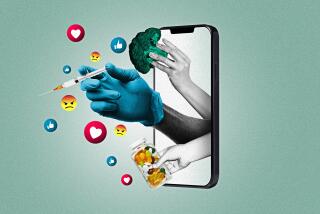Letters: Different views on the need for vitamin D
- Share via
I was deeply saddened with the Institute of Medicine report that we are a healthy nation in regard to our calcium and vitamin D intakes [“Sweeping Away the Hype About Vitamin D,” Dec. 6]. As a physician keenly interested in my patients’ nutrition status and needs, I find the report flawed. By arbitrarily setting the lower limit of normal vitamin D blood level at 20 nanograms per milliliter, they are missing the borderline deficiency between 20 and 40 ng/ml.
I recommend 2,000 international units of vitamin D per day to my adult patients. I have never encountered an elevated vitamin D level with this routine, nor have I seen kidney stones as a consequence.
A flawed study presents a real danger to our health at a time when our children and their parents need better guidance. The IOM must do a better job.
Jerome P. Helman, M.D.
Venice
The Health section article refers to the Harvard vitamin study findings. That study of vitamins was started years ago. It provided vitamins or placebos to doctors and nurses, a very reliable group of study participants. I was, and still am, a participant in the study.
Over the years, the study demonstrated that supplemental vitamins had no discernible value. All but vitamin D were withdrawn from the study. Vitamin D and its placebo are still being studied.
To this day I still don’t know when I’m taking a placebo or the real vitamin. I’m periodically requested to fill out health report forms sent to me by the Harvard study.
Melvin H Kirschner, M.P.H., M.D.
Granada Hills
Homeopathic letters
I appreciate that you included an article about homeopathy in the Health section [“Homeopathic Cold Remedies Are Quite Diluted,” Dec. 6]. But it wasn’t strong enough.
Most people think “homeopathic” is a synonym for “organic,” “natural” and the like. Homeopathic medicines are often touted as being “safer” because they don’t have side effects. Of course they don’t have side effects — there’s nothing there! Yet, doctors prescribe them to their patients, and people line up to purchase this nonsense in health food stores.
In clinical trials, no homeopathic medicine has ever performed better than a placebo. The philosophy behind homeopathy is scientifically completely unsound.
Elizabeth Nees
Long Beach
Chris Woolston’s article on homeopathic medicines for colds quoted William Gleason, who may be an expert on conventional pharmacology, but he is woefully under-informed about homeopathic medicine.
Gleason asserts that homeopathic medicines are so diluted that there’s “no longer any medicine in the medicine.” This is patently wrong. The vast majority of homeopathic medicines sold in pharmacies and health food stores have extremely small doses of medicinal agents.
Further, Gleason seems to be uninformed about the thousands of studies from a wide variety of scientific disciplines on the power of small doses of certain substances on special biological systems. The newest research, just conducted at India’s most respected scientific institute, confirms that even homeopathic medicines that have undergone “extreme dilution” maintain ponderable molecular doses of the original medicine.
Dana Ullman, MPH
Berkeley
The writer is the author of “The Homeopathic Revolution.”
Letters to the editor highlights selected reader comments on recently published articles.
All submissions are subject to editing and become the property of The Times.
Please e-mail [email protected].





